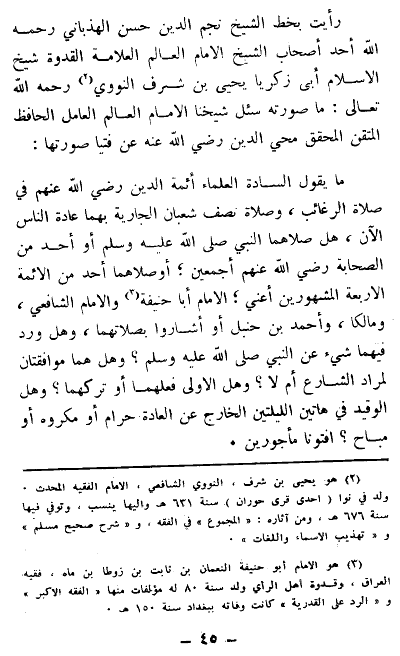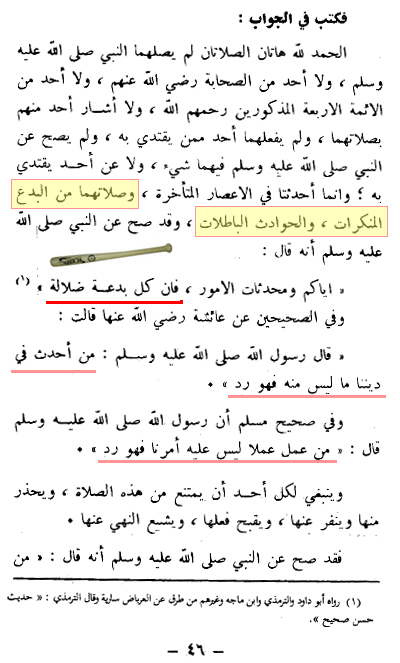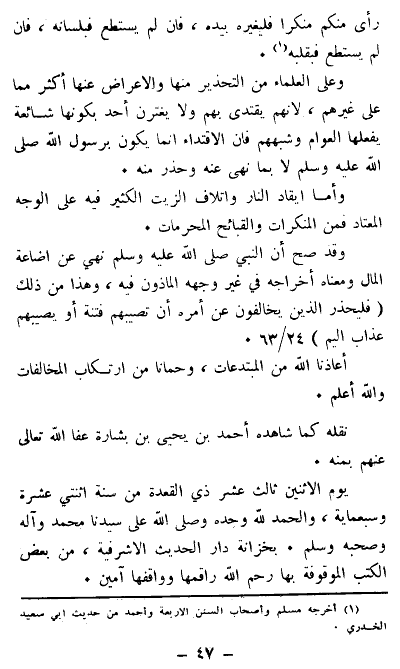Bidah.Com
Posted by Abu.Iyaad on Monday, July, 25 2011 and filed under Foundations
Key topics: Bidah Haqiqiyyah • Bidah Idafiyyah

Background
The grave-worshippers and innovators from the Sufis and other than them attempt to pull the wool over the eyes of the common folk by deceiving them about numerous statements which have come from the Scholars which appear to legitimize what is referred to as "bid'ah hasanah" (good innovation). The statements they quote come from Imaam al-Shafi'ee (see here), or al-Nawawi (see here) or al-Izz bin Abd al-Salam (see here, here, and here) and others. The crux of the matter is that some of the Scholars have used the word bid'ah in a broader linguistic sense to refer to actions which either have a specific foundation in the Shari'ah (tarawih prayer in congregation, and established acts of goodness such as giving charity) or are matters of public interest that relate to ways and means (wasaa'il) through which beneficial interests are realized and maintained. All of this is different to maqaasid (goals, objectives) which is the case in the innovations in worship (ibaadaat), which are sought in and of themselves. To give an example, the compilation of the Qur'an is not an end sought in itself but as a means to preserve the religion, and whilst there is no specific injunction about putting the Qur'an into a single book, there is a non-specific broad support for it by the fact that preservation of the religion is obligatory and since this cannot be achieved except through preserving the Qur'an, putting the Qur'an into a single book is obligatory (upon the reasoning of those Scholars). This is a matter of public interest to enable the preservation of one of the five necessities, in this case, religion (the others being life, intellect, wealth and lineage). So these matters in reality do not come under the definition of bid'ah as it has come in the Shari'ah, but enter into the wider linguistic meaning. This is preciesly what al-Shafi'ee (and others) intended as is explained and proven in this series. What we aim to do in this series is to provide evidences and examples that demolish the argument of the innovators that "what they are doing of innovations in worship have a basis in the Shari'ah" and therefore cannot be shown rejection. This is gross deception and they are in reality confusing between bidah idafiyyah (condemned in the Shariah) and matters that have been labelled bidah from a purely linguistic perspective - to have more clarity on this, see the comphrehensive diagram in this article. Once it is clear that these Scholars speak of "praiseworthy bidah" and some of them enter bidah into the rulings of wajib, mandub and mustahabb only from the angle of excluding these matters from being wrongly included within the bidah that is blameworthy in the Shariah, we see that they are subsequently in complete agreement with all the other Scholars of Ahl al-Sunnah that bidah in worship (as in that by which nearness to Allaah is sought) is absolutely prohibited and is repugnant and evil and all innovation (as intended by the Shariah) is misguidance. This is made clear by all the quotes in this series inshaa'Allaah from the Messenger (alayhis salaam), the Companions, the Salaf, and the Scholars in general.
Quotes from Shafi'i Jurists
We have some valuable quotes in some of the more lengthy articles dealing with the academic fraud of todays innovators in trying to twist the statements of al-Shafi'i and some of the later Shafi'ite jurists such as al-Nawawi and al-Izz bin Abd al-Salam to justify innovations in worship in a broad sense. Because these are important quotes and are buried in long articles, we are going to isolate them and give them their own separate article for easy reference and linking purposes. At the same time it should be pointed out that whilst there is agreement between the general tone and spirit in the rejection by these scholars of innovations in worship and between what the Salaf were upon of the same, because of their particular orientation in understanding this matter, some of these jurists may have allowed certain affairs which the Salaf never allowed and which the Salaf would have treated as blameworthy innovations.
Imam al-Nawawi's Refutation of The Bid'ahs of Salat al-Ragha'ib and Salat Nisf Sha'ban
View this quote in the original article here:
This is the first fatwa and it is found in the manuscript of Ahmad bin Yahya bin Bashara as indicated at the end of it, being copied on 13th Dhul Qa'dah, 712H.



Here is a translation of the question and answer:
What is said by the leading scholars, the imaams of the religion (radiallaahu anhum) regarding Salat al-Ragha'ib and the Salat Nisf al-Sha'ban which are commonly practised by the people now. Did the Prophet (sallallaahu alayhi wasallam) pray them or anyone from the Companions (radiallaahu anhum ajma'een), or did any of the well-known for Imaams pray them, I mean, the Imaam Abu Hanifah, Imaam al-Shafi'i, and Malik and Ahmad bin Hanbal, or did they make any indication towards praying either of these (prayers). And is anything related about them from the Prophet (sallallaahu alayhi wasallam)? And are they in agreement with the intent (muraad) of the Shariah or not? And is it better to perform them or abandon them. And is kindling fire on these two nights above and beyond what is customary unlawful or disliked or permitted? Please answer us, rewarded in your endeavour.
So he (al-Nawawi) wrote in the answer:
All praise is due to Allaah. These two prayers were not prayed by the Prophet (sallallaahu alayhi wasallam) and nor anyone from the Companions (radiallaahu anhum), and nor any of the aforementioned four Imaams (rahimahullaah), and nor did any of them hint at it, and no one who is worthy of being followed has practiced it, and nothing is authentically related from the Prophet (sallallaahu alayhi wasallam) at all, and nor from anyone who is worthy of being followed. Rather, it was introduced in the later times, and praying them both is from the rejection innovations, and the futile newly-invented matters. And it is authentically related from the Prophet (sallallaahu alayhi wasallam) that he said: "Beware of the newly-invented matters, for every innovation is misguidance", and in the two Sahihs from Aa'isah (radiallaahu anhaa) who said: The Messenger of Allaah (sallallaahu alayhi wasallam) said, "Whoever introduced into this affair of ours that which is not from it will have it rejected", and in Sahih Muslim that the Messenger of Allaah (sallallaahu alayhi wasallam) said, "Whoever does an action which is not upon our affair will have it rejected."And it is desirable for everyone to prohibit this prayer, warn from and and make [the people] flee from it, to render its performance as repugnant, reprehensible, and to spread its prohibition everywhere (amongst the people). For it is authentically related from the Prophet (sallallaahu alayhi wasallam) that he said, "Whoever amongst you sees an evil, let him change it with his hand, and if he is not able, then with his tongue, and if he is not able then with his heart."
And it is upon the Scholars to warn from it, and to turn away from it more so than it is upon others because they are taken as a model to be followed. And no one should be deceived by the fact that it is common, being practised by the common-folk, and nor by their doubts, for indeed, following (in guidance) is only done through the Messenger of Allaah (sallallaahu alayhi wasallam), not through what he himself has prohibited and warned against.
As for lighting fire and burning a lot of oil over it in the way that is done, then it is from the evils and repugnant prohibitions. And it is authentically related that the Prophet (sallallaahu alayhi wasallam) prohibited from wastage of wealth, and its meaning is to spend it upon other than the angle from which it is permitted to spend, and this action is from that, [Allaah said], "Let those beware who oppose his (the Messenger's) command that a tribulation should afflict them or a painful torment should afflict them" (24:63). May Allaah protect us from the innovated matters and protect us from falling into the oppositions, and Allaah knows best.